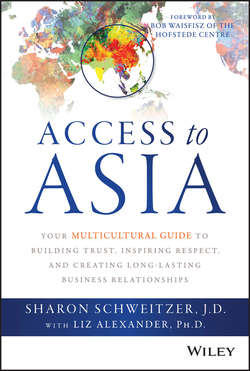Читать книгу Access to Asia - Waisfisz Bob - Страница 10
Chapter 2
Exploring Country Cultures
Thinking Is Not Universal
ОглавлениеThe Machiguenga study helps highlight the erroneous assumption that there are universal ways of thinking, feeling, and behaving. This bias is played out in organizations day after day, especially as it relates to leadership and management research and advice.
Consider this quote from a New York Times interview with the director of the U.S. – based NeuroLeadership Institute:
“Certainty is a constant drive for the brain…the feeling of uncertainty feels like pain…that turns out to be cognitively exhausting.... The less we can predict the future, the more threatened we feel…so we are driven to create certainty.”25
Did you assume the we in that quote meant we humans? Actually, it more accurately refers only to certain cultures.
Geert Hofstede's studies over a 40-year span resulted in various dimensions of national cultures. These cultural dimensions must be compared within the context of other country scores and not analyzed as a standalone dimension. As mentioned previously, one of Hofstede's dimensions looks at the issue of uncertainty avoidance by measuring the extent to which people across 76 countries and regions “feel uncomfortable with uncertainty and ambiguity.”26 According to Hofstede's model, the higher the score, the more people within that culture will be uncomfortable with the new, unknown, and surprising. Such cultures deal with that discomfort with strict laws and rules; they also tend to espouse one unassailable truth. For more on this topic, see Chapter 3, pages 45–46. Scores on the uncertainty avoidance dimension range from cultures like Greece and Portugal, which scored 112 and 104 respectively, to Singapore and Jamaica, which scored 8 and 13 respectively.
The U.S. score on the uncertainty avoidance dimension is 46, which Hofstede describes as the medium to low range, similar to Indonesia (48), the Philippines (44), and India (40). The U.S. score is quite different from that of Japan (92), South Korea (85), Taiwan (69), China (30), and Hong Kong (29). As these data illustrate, there are considerable variations of tolerance of uncertainty and ambiguity throughout Asia. To assert that all human beings are “driven to create certainty” is misleading at best.
25
Adam Bryant, “A Boss's Challenge: Have Everyone Join the ‘In’ Group,” The New York Times, March 23, 2013, www.nytimes.com/2013/03/24/business/neuroleadership-institutes-chief-on-shared-goals.html?_r=2& (accessed November 20, 2014).
26
“Dimensions,” The Hofstede Center, http://geert-hofstede.com/dimensions.html (accessed November 20, 2014).
